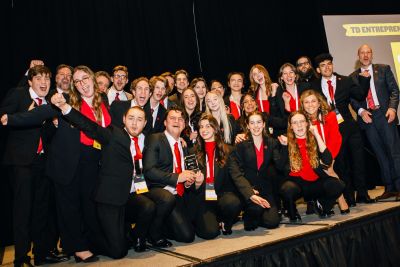Students savour traditional flavours and practices on Indigenous Culinary Arts field trip
Okanagan College Media Release
Salmon fillets roast on stakes over an open fire while roe bubbles up in a steaming pot of vegetable and fish soup nearby. These are signs of a finished and ready-to-eat meal, yet indicate the start of something special cooking here at Okanagan College.
On a field trip to the Westbank First Nation late last month, OC’s Indigenous Culinary Arts class had the opportunity to learn about the traditional Okanagan-Syilx style of cooking in a hands-on experience, hosted by Elders Pamela and Grouse Barnes. The gastronomic outing contained a variety of chopping, mixing and other culinary techniques all aimed at producing a final meal for the class to enjoy together.
The field trip to the Barnes’ property felt like home for many of them, despite the differences in style and practice.
“This has been quite the experience,” says Ruby Pahtayken, a student from the Cree Nation in Saskatchewan. “All of this is new to me. Back home, we don’t have the same fish, but this is how we uniformly cook it, over the open fire. Cooking like this in your own backyard and learning the teachings from our ancestors, our grandmothers and grandfathers, brings me back home.”
The field trip is an important ingredient of the brand new intake which launched this past March, as part of the broader Culinary Arts program offered at the College. With tradition at the heart of the new program, students follow the same curriculum to that of their counterparts in other intakes, but the flavour of Indigenous culture is heavily infused.
Walking with the students at each step in the process, the Barnes’ passion for teaching future generations lies in the sharing of knowledge, and in this case, hands-on learning. Together with family, they run Wildrose Native Traditions, where they lead field trips for students in the area, teaching about Indigenous culture.
“For me, it’s about sharing knowledge, sharing the stuff that we do,” Grouse explains. “We share because we know that the knowledge we share is like a calm pond. When you throw a pebble in the middle, the ripple affects not only students here, but whoever they’re going to teach: their kids, grandbabies, where they take this knowledge.”
Pahtayken adds that the gathering and foraging of plants serves as a metaphor for her returning home to Saskatchewan with new knowledge.
“What I can utilize and gather here in the field is similar to the gathering of information. I can take it back home to Saskatchewan and I can share it with my community.”
These values of applied learning are integral to the program, something Director of Food, Wine and Tourism at OC, Jonathan Rouse, says acknowledges the value of Indigenous culture in the area and within the food industry as well.
“The culinary world is still predicated on very historical European practices. We’re moving much farther than that,” he explains. “Here’s an opportunity for us to take local Indigenous values and practices and see how we can embed them into the curriculum and learn from that.
“The Okanagan is so rich and diverse; it’s really a classroom. It brings the whole food and culinary scene alive.”
The program is open to anyone, however, every student in the inaugural class is from a Canadian Indigenous background. The pilot is supported by the Industry Training Authority (ITA) and the Okanagan Training and Development Council (OTDC), which also plays a part in assisting students from the moment they enrol to the time they begin searching for a job.
As the pilot program continues, the Culinary Arts department will look to both current and prospective students to gauge the growth and progression of the program. With more field trips like this one planned for the future, prospective students can learn more about the Indigenous intake at www.okanagan.bc.ca/culinary.
Salmon fillets roast on stakes over an open fire while roe bubbles up in a steaming pot of vegetable and fish soup nearby. These are signs of a finished and ready-to-eat meal, yet indicate the start of something special cooking here at Okanagan College.
On a field trip to the Westbank First Nation late last month, OC’s Indigenous Culinary Arts class had the opportunity to learn about the traditional Okanagan-Syilx style of cooking in a hands-on experience, hosted by Elders Pamela and Grouse Barnes. The gastronomic outing contained a variety of chopping, mixing and other culinary techniques all aimed at producing a final meal for the class to enjoy together.
The field trip to the Barnes’ property felt like home for many of them, despite the differences in style and practice.
“This has been quite the experience,” says Ruby Pahtayken, a student from the Cree Nation in Saskatchewan. “All of this is new to me. Back home, we don’t have the same fish, but this is how we uniformly cook it, over the open fire. Cooking like this in your own backyard and learning the teachings from our ancestors, our grandmothers and grandfathers, brings me back home.”
The field trip is an important ingredient of the brand new intake which launched this past March, as part of the broader Culinary Arts program offered at the College. With tradition at the heart of the new program, students follow the same curriculum to that of their counterparts in other intakes, but the flavour of Indigenous culture is heavily infused.
Walking with the students at each step in the process, the Barnes’ passion for teaching future generations lies in the sharing of knowledge, and in this case, hands-on learning. Together with family, they run Wildrose Native Traditions, where they lead field trips for students in the area, teaching about Indigenous culture.
“For me, it’s about sharing knowledge, sharing the stuff that we do,” Grouse explains. “We share because we know that the knowledge we share is like a calm pond. When you throw a pebble in the middle, the ripple affects not only students here, but whoever they’re going to teach: their kids, grandbabies, where they take this knowledge.”
Pahtayken adds that the gathering and foraging of plants serves as a metaphor for her returning home to Saskatchewan with new knowledge.
“What I can utilize and gather here in the field is similar to the gathering of information. I can take it back home to Saskatchewan and I can share it with my community.”
These values of applied learning are integral to the program, something Director of Food, Wine and Tourism at OC, Jonathan Rouse, says acknowledges the value of Indigenous culture in the area and within the food industry as well.
“The culinary world is still predicated on very historical European practices. We’re moving much farther than that,” he explains. “Here’s an opportunity for us to take local Indigenous values and practices and see how we can embed them into the curriculum and learn from that.
“The Okanagan is so rich and diverse; it’s really a classroom. It brings the whole food and culinary scene alive.”
The program is open to anyone, however, every student in the inaugural class is from a Canadian Indigenous background. The pilot is supported by the Industry Training Authority (ITA) and the Okanagan Training and Development Council (OTDC), which also plays a part in assisting students from the moment they enrol to the time they begin searching for a job.
As the pilot program continues, the Culinary Arts department will look to both current and prospective students to gauge the growth and progression of the program. With more field trips like this one planned for the future, prospective students can learn more about the Indigenous intake at www.okanagan.bc.ca/culinary.



